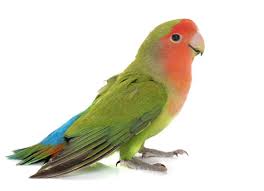
Peach-faced Lovebird
Conditions of detention
Peach-faced lovebirds require a spacious cage that allows for ample movement and play. The cage should have horizontal bars for climbing, perches, toys, and various enrichment activities. It’s important to place the cage in a well-lit area away from drafts and direct sunlight.
Useful Fact: Lovebirds are highly social creatures and do best when kept in pairs or small groups. If kept alone, they require significant interaction with their human caregivers to prevent loneliness and boredom.
Nutrition and diet
A balanced diet for Peach-faced lovebirds includes high-quality pellets, fresh fruits, vegetables, seeds, and occasional nuts. Leafy greens, carrots, apples, and berries provide essential vitamins and nutrients.
Useful Fact: While seeds can be part of their diet, they should not be the sole component, as they can lead to nutritional imbalances. A varied diet helps ensure optimal health.
Health
Peach-faced lovebirds are generally hardy birds but can be prone to certain health issues such as respiratory infections, feather plucking, and nutritional deficiencies. Regular veterinary check-ups are important for maintaining their health.
Useful Fact: Monitoring their droppings for changes in color or consistency can provide early signs of health issues that require attention.
Grooming and care
Peach-faced lovebirds groom themselves by preening their feathers and enjoy regular baths. Providing a shallow dish of water for bathing or misting them lightly with water can help maintain healthy feathers.
Useful Fact: Regular cleaning of the cage and accessories is crucial to prevent bacterial growth and ensure a hygienic environment.
Education and training
Peach-faced lovebirds are intelligent and can be trained to perform simple tricks and mimic sounds. Positive reinforcement and patience are key to successful training.
Useful Fact: Training sessions should be kept short (5-10 minutes) to maintain their interest and reinforce learning. Lovebirds respond well to interactive play and rewards.
Toys and entertainment
Toys are essential for keeping Peach-faced lovebirds entertained and mentally stimulated. They enjoy a variety of toys, including swings, bells, and foraging toys. It is important to rotate toys regularly to keep them engaged.
Useful Fact: Lovebirds enjoy toys that encourage chewing and manipulation, as these activities help keep them mentally stimulated and prevent boredom.
Safety
Ensure the living environment is free from hazards such as toxic plants, fumes from non-stick cookware, and small objects that could be ingested. The cage should be secure with appropriate bar spacing to prevent escape.
Useful Fact: Avoid using non-stick cookware around lovebirds, as the fumes can be toxic and even fatal to birds.
Accessories
Essential accessories include sturdy perches, food and water dishes, and a variety of toys. Accessories should be made from safe materials like untreated wood or stainless steel.
Useful Fact: Natural wood perches help maintain foot health by varying the pressure points on their feet compared to uniformly shaped perches.
Socialization
Peach-faced lovebirds are social creatures and thrive on interaction with humans and other birds. They should not be kept in isolation for extended periods.
Useful Fact: Spending time with your lovebird daily helps fulfill their social needs and strengthens the bond between you and your bird.
Travel and Transportation
When traveling with Peach-faced lovebirds, use a secure and well-ventilated travel cage. It’s important to keep the cage covered during transport to reduce stress.
Useful Fact: Familiarizing your lovebird with the travel cage by placing it in their living space and allowing them to explore it before any trips can help reduce travel-related anxiety.
Behavior and psychology
Peach-faced lovebirds exhibit a range of behaviors and vocalizations that indicate their mood and health. Understanding these signals is essential for proper care.
Useful Fact: Lovebirds are known for their vocalizations and can become quite loud, especially when seeking attention or during play. They are also known for their strong pair bonds and affectionate behavior towards their mates.
Legal aspects
In most areas, there are few legal restrictions on keeping Peach-faced lovebirds as pets, but it is important to ensure that any lovebirds purchased are from reputable breeders or pet stores, and not taken from the wild.
Useful Fact: Always check local regulations to ensure compliance with laws regarding pet ownership and breeding, as some areas may have specific requirements.


